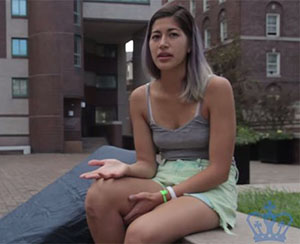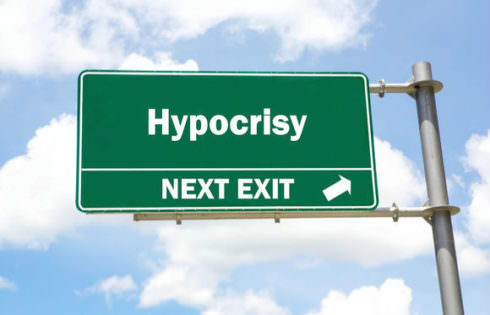
We’ve previously covered the rape allegations by Columbia University student Emma Sulkowicz against her alleged rapist, which involve Sulkowicz carrying around her mattress as a protest against the school’s investigation of her former friend-with-benefit Paul Nungesser.
Now Nungesser himself is speaking – and providing evidence of their continued friendship after the alleged rape.
Journalist Cathy Young, whose work often focuses on the civil-liberties implications of assault allegations and sexist assumptions about women, actually interviewed Nungesser for The Daily Beast and got a trove of since-deleted Facebook messages between himself and his accuser.
Nungesser’s account differs only from Sulkowicz’s in whether their sex that night was consensual all the way through. Sulkowicz herself told Young that the three months of Facebook messages he provided were authentic and “not redacted.”
Among them, two days after the alleged rape, Nungesser invites Sulkowicz to a “small shindig” and she responds:
lol yusss
Also I feel like we need to have some real time where we can talk about life and thingz
because we still haven’t really had a paul-emma chill sesh since summmmerrrr
Eleven days later, she initiated contact. She asked if he wanted to hang out before or after the coed frat meeting they were both attending:
whatever I want to see yoyououoyou
respond—I’ll get the message on ma phone
And when he sent her a birthday greeting in October, she said “I love you Paul.” They didn’t see each other much after that, which Nungesser took as Sulkowicz simply hanging with a new crowd. Nothing out of the ordinary in college.
The witch hunt against Nungesser, an exchange student from Germany, started in April when Sulkowicz filed a complaint – and two more girls then accused him of sexual violence – though with the help of his parents and a criminal attorney, he beat all charges at Columbia.
This despite the fact that he wasn’t allowed to provide the Facebook exchanges in the disciplinary process.
Michael Roberson (a pseudonym), a grad student who was Nungesser’s official “supporter” during the disciplinary process but didn’t previously know him, came to believe the charges against him were “completely false” by the end. He strongly disputes that Sulkowicz got a raw deal in panel questioning:
“The panel were asking sensible questions; they were equally asked of Paul, and had been asked of Paul through the entire process. I’d been sitting in on the initial meetings where his statements were noted down. The questions were extremely personal because they had to be. That was much more graphic than anything that happened in the hearing, and the questions were asked with the utmost sensitivity.”
The backlash to Young’s exclusive reporting, unsurprisingly, has been swift.
Good reporting ‘works to shame and silence victims’
Self-proclaimed feminist blogger Julie Zeilinger wrote in Mic that Young’s article shows the “disheartening ignorance regarding the realities of rape and survivorship,” such as victims’ continuing relationships with their attackers:
After her assault, Sulkowicz’s reaction was to seek a conversation with her rapist. “I was upset and confused. … I wanted to have a talk with him to try to understand why he would hit me, strangle me and anally penetrate me without my consent,” she says. Sulkowicz’s response may not align with the perfect victim narrative, but it’s reflective of the fact that there is no one way to react to trauma.
This is why so many survivors stay with their abusers; the cycle of abuse is complex, personal and ultimately unknowable to anyone aside from the survivors themselves.
Young’s reporting – the publishing of Facebook exchanges that cast doubt on Sulkowicz’s heretofore unchallenged narrative – is an “implied means of discrediting Sulkowicz,” and therefore Young “works to shame and silence victims, perpetuating a cycle that allows campus sexual assault to persist at shocking rates,” Zeilinger writes.
Of course, you could say the same about the Washington Post‘s excellent reporting that unmasked the terribly unprofessional journalism practiced by Sabrina Erdely and her editors at Rolling Stone in the “Jackie” gang-rape fabrication at the University of Virginia.
After all, Post reporters gave skeptics of the “rape culture” narrative quite the ammunition to cast doubt on any subsequent accuser.
Seeking to control the narrative through shaming is nothing new
While Zeilinger complains about the “perfect victim” narrative the media allegedly use regarding rape allegations – favoring “virginal” victims over messy, ambiguous women like Sulkowicz – she declines to note the prevailing narrative that accused men must be guilty in some way.
We’re told that “only” 2-8 percent of rape claims are false. (Ruining the lives of eight innocent men out of 100, by denying them any semblance of due process, is acceptable collateral damage.)
Similarly, you’ll have trouble finding a news story in any mainstream publication that treats an accusing person as anything other than a victim or “survivor.” It’s built into the language of coverage.
It’s the same reason news organizations have mostly declined to identify rape accusers for two decades – journalists go out of their way to exempt accusers from the treatment they’d give anyone else, including other “victims.” You see its ridiculous and logical results in Rolling Stone‘s credulous, cheerleading coverage.
Sulkowicz herself complained after she turned her allegations into a performance art project that she was under attack from the media, which “triggered” her by doing their job.
Sulkowicz, Zeilinger and their cheerleaders have one goal in mind: Stop actual journalism and shame journalists into adopting their preferred narrative – in this case, as an end run around both the campus disciplinary system and the criminal justice system.
This is nothing new. It’s what PR pros do when they’re having trouble getting their clients’ narratives adopted in coverage (if you hear a reporter screaming into her phone in the newsroom, guess who’s on the other end yelling), and it’s deployed across the ideological spectrum.
Perhaps most famously, it’s why the American public learned about the government’s warrantless surveillance program more than a year after the New York Times first did – the Bush administration essentially shamed reporters that another terrorist attack would be on their heads if they did their job.
Everyone wants to control the narrative. But we’re all worse off if journalists abdicate their responsibility to thoroughly report. In this case, women get infantilized; men get vilified; the public gets comfortable, validating narratives.
Save that for Lifetime original movies.
Greg Piper is an assistant editor at The College Fix. (@GregPiper)
Like The College Fix on Facebook / Follow us on Twitter
IMAGE: YouTube screenshot
Like The College Fix on Facebook / Follow us on Twitter







Please join the conversation about our stories on Facebook, Twitter, Instagram, Reddit, MeWe, Rumble, Gab, Minds and Gettr.